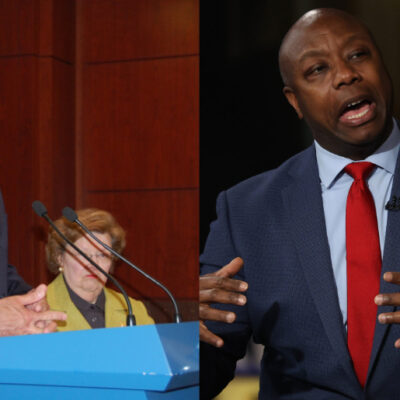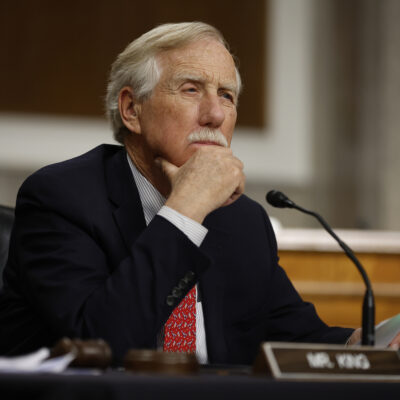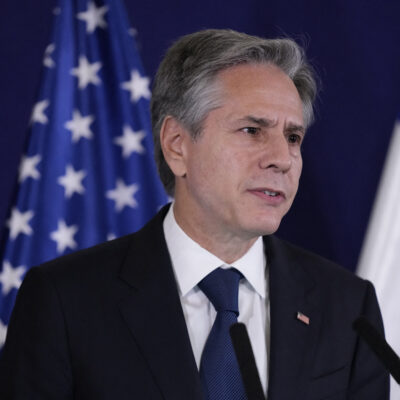Coronavirus causes congressional campaigns to shift focus, strategy
'The term social distancing is just about the perfect antonym to the term political campaign'

Courtesy
Jake Auchincloss Courtesy
The coronavirus is shaking up congressional races around the country, causing candidates to shift their messaging to address the pandemic and its effects on their districts.
Campaigning at a distance: “The term social distancing is just about the perfect antonym to the term political campaign. We’ve had to recalibrate everything,” said Jake Auchincloss, who is running in a crowded Democratic primary in Massachusetts’s 4th district. Auchincloss, who serves as a city councilor in Newton, told JI he’s doing outreach through video and phone calls. “If you can’t canvass by door, and if you can’t do meet-and-greets in people’s homes, how do you still establish connections with voters? Because conversations with voters at the end of the day [are] what matters.”
Dominating the conversation: The virus is now the leading issue in campaigns across the country, congressional candidates tell JI. “This is by far the number one issue” voters are talking about, Gina Ortiz Jones, the Democratic nominee in Texas’ 23rd district, told JI. “People have real concerns about their ability to meet the bills that are due here in just over a week. So this is by far the number one issue. It’s a health issue but it’s also an economic issue.”
Feeling the effects: Sara Jacobs, who’s running in California’s 53rd district, told a similar story. “It’s clear that everyone is feeling this crisis and is scared of what is happening right now. And especially so many folks in the district whose small businesses are not getting any money, whose incomes are being cut because of this,” Jacobs said. “I think it’s affecting every single person, and it’s clearly dominating the conversation.”

Sara Jacobs
Not forgotten: Mike Garcia, a Republican running in a special election in California’s 25th district on May 12, said voters have been asking about other aspects of the campaign as well. “Folks are talking about the coronavirus for the first few seconds, but right away, the focus is the campaign and how we’re gonna win,” Garcia said. “I think people have resigned themselves to the quarantine and they’re trying to just do what they can.”
Change of strategy: As social distancing has put an end to most in-person campaigning, candidates are doubling down on their digital strategy and operations, including holding digital town halls and other online and phone-in events. “We’re a young, nimble campaign, so we’re able to adjust and use technology to our advantage,” said Ammar Campa-Najjar, who is running in California’s 50th district. “And so we’re going to use the fact that we’re a young campaign, more tech-savvy, and use that to kind of overcome the obstacles of this moment.”
Looking ahead: Campa-Najjar said his campaign will continue to rely on mailers, postcards and phone-banking, and he’s hoping he’ll be able to get back to meeting voters face-to-face later in the race. “Hopefully by the time October and September roll around, we’ll be past this — and not just for campaigns but for the country,” he added.
Campaign finance: Candidates are also developing new strategies to keep cash flowing in during the crisis. Garcia has been holding “flash-funding teleconferences,” bringing groups of 15 to 30 donors onto a 45-minute phone call: “We’re still getting great support from the donors.”
Resources for communities: Campaigns throughout the country are also working to provide resources to their potential voters to help them through the crisis. Alan Khazei, who is running in the Democratic primary in Massachusetts’s 4th congressional district, is using social media to reach out to constituents. “I feel privileged, I have this platform. And I’m just trying to use it to connect with people and inform them and share policy ideas and get access to experts,” Khazei told JI, noting that the next digital event he is hosting will feature Rep. Jamie Raskin (D-MD), a former classmate of his from Harvard.

Gina Ortiz Jones
Advocacy: In Texas, Jones and her campaign are trying to help people access information about the virus — efforts that have included translating materials into Spanish, connecting constituents with federal resources and advocating for vulnerable communities. “What we tried to do is fill the void of information that’s not getting out,” she said. “We’ve pivoted in a major way, in light of the need that we’re seeing in the community,” Jones added. Jacobs said that since the current situation has made it difficult for critical workers to find childcare, her campaign has set up a fund to subsidize childcare costs.
Empty seat: Garcia has been taking on a similar role, which he said is especially important in his district, which currently has no representation in Congress following the resignation of Rep. Katie Hill (D-CA) in October. “I have taken on a responsibility to make sure that we’re getting the information out to our district, to our constituents, both sides of the aisle,” he said.
Continuing the work: California Assemblywoman Christy Smith is running against Garcia in the state’s 25th congressional district at the same time that she’s serving her assembly district, and the work, she says, sometimes overlaps. “As a state assemblymember, at this critical time, I am currently focused on my work as this community’s public servant, ensuring state response to my local constituents and connecting people with essential information, services, and resources,” Smith said. “My campaign has moved to prioritizing remote voter contact, through tools like texting with voters, at-home, phone banking, and encouraging supporters to speak with their friends and family about early voting by mail in advance of our May 12th special election.”
Online only: Ben Sigel, another candidate in Massachusetts’s 4th district, told JI that he’s gone “fully digital” — as part of that effort, he’s held a series of Facebook Live sessions with local experts and doctors to provide information to constituents to help them navigate issues related to the coronavirus crises.
Democrats attack Republican leadership: Democratic candidates are also focusing their attacks on the Trump administration’s response to the pandemic. Jones said the federal government could do more, including ensuring that medical equipment is available and affordable.










